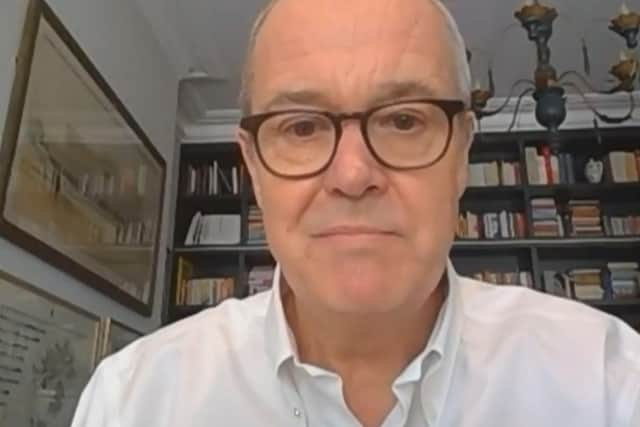Employers could 'actively discriminate' against workers with coronavirus antibodies, scientists warn
This article contains affiliate links. We may earn a small commission on items purchased through this article, but that does not affect our editorial judgement.
A paper drawn up by the scientific pandemic influenza group on behaviour (SPI-B), considered by the scientific advisory group for emergencies (Sage) at its April 14 meeting, suggested employers might “actively discriminate” against workers who were not shown to have antibodies.
The note said: “Some employers may discriminate on the basis of antibody status. This might include not permitting those testing antibody negative to return to work or only taking on new staff with antibody positive test results.
Advertisement
Hide AdAdvertisement
Hide Ad“Work may also be allocated among employees based on test status with, for example, customer-facing work being allocated to those who have tested antibody positive.


Join our new coronavirus Facebook group for the latest confirmed news and advice as soon as we get it
“In some circumstances this may be appropriate, but in others this might constitute adverse discrimination. This risk applies across all occupational sectors.”
The note also warned about the risk of people trying to “game” the system by attempting to purchase a fake test result.
Advertisement
Hide AdAdvertisement
Hide AdThe note also considered the risk that people who had tested antibody positive may not follow precautions against the spread of the virus because they believed they could not catch it again while people who did not have antibodies may be reluctant to leave lockdown or return to work.
It was revealed as papers from Sage meetings were published shwoing the advice which had been given to Government from experts.
Ministers were also told lockdown restrictions should be eased very gradually in order to maintain public trust in health policy.
At a Sage meeting on April 2, the same SPI-B group suggested the abrupt lifting of restrictions imposed for months may lead to people believing the risk of infection has ceased or significantly reduced.
Advertisement
Hide AdAdvertisement
Hide AdThe paper y states: “If there is then an increase in infection rates that necessitates a reintroduction of restrictions this is likely to be seen as a serious failure of policy and trust in public health advice will be lost, leading to lower adherence to advice to restrict or to resume activity.
“To avoid these problems we would advocate trialling easing restrictions very gradually when epidemiologically indicated while clearly explaining why these particular activities are being resumed and how risks must be controlled if these activities are to be maintained.”
The note adds this method would allow an opportunity to gather epidemiological evidence about the impact of easing the restriction and provide evidence to the public about its impact.
It continues: “To maintain public trust and support it will be important to have acceptable and equitable criteria for selecting which activities can be resumed.”
Advertisement
Hide AdAdvertisement
Hide AdMeanwhile, appearing in front of the Commons Health Select Committee, Chief Scientific Adviser Sir Patrick Vallance said Sage papers would continue to be published after an outcry to see the reasoning behind Government decisions.
Asked about the importance of advice from Sage being published, Sir Patrick told the committee he has been a “strong advocate for transparency” throughout his career.
“I absolutely believe in transparency and openness. As you are aware we have published some of the papers of Sage and we’ll continue to publish them. Some more have come out this morning.”
Sir Patrick said it is worth reflecting that if you look back to the period before Sage was formed it is “very difficult” to know what the science advice was because it was “often not published at all”.
Advertisement
Hide AdAdvertisement
Hide Ad“I think we’re in a better position than the past, but I completely accept that with an ongoing situation like this it’s very important that the science advice is known, and the science advice should be open to scrutiny.”
Sir Patrick said he thinks it is up to politicians to decide when they think they are happy to have the advice that has gone to them released into the public domain.
--------------
Editor’s note: First and foremost - and rarely have I written down these words with more sincerity - I hope this finds you well.
Almost certainly you are here because you value the quality and the integrity of the journalism produced by The Yorkshire Post’s journalists - almost all of which live alongside you in Yorkshire, spending the wages they earn with Yorkshire businesses - who last year took this title to the industry watchdog’s Most Trusted Newspaper in Britain accolade.
Advertisement
Hide AdAdvertisement
Hide AdAnd that is why I must make an urgent request of you: as advertising revenue declines, your support becomes evermore crucial to the maintenance of the journalistic standards expected of The Yorkshire Post. If you can, safely, please buy a paper or take up a subscription. We want to continue to make you proud of Yorkshire’s National Newspaper but we are going to need your help.
Postal subscription copies can be ordered by calling 0330 4030066 or by emailing [email protected]. Vouchers, to be exchanged at retail sales outlets - our newsagents need you, too - can be subscribed to by contacting subscriptions on 0330 1235950 or by visiting www.localsubsplus.co.uk where you should select The Yorkshire Post from the list of titles available.
If you want to help right now, download our tablet app from the App / Play Stores. Every contribution you make helps to provide this county with the best regional journalism in the country.
Sincerely. Thank you.
James Mitchinson
Editor